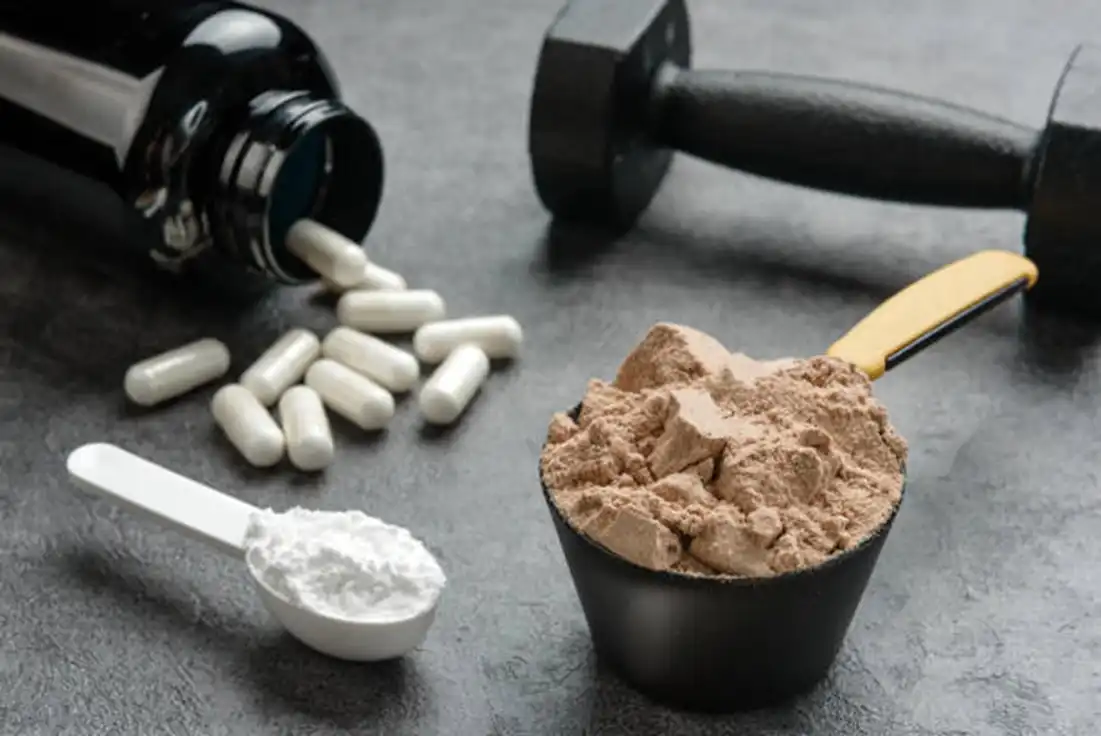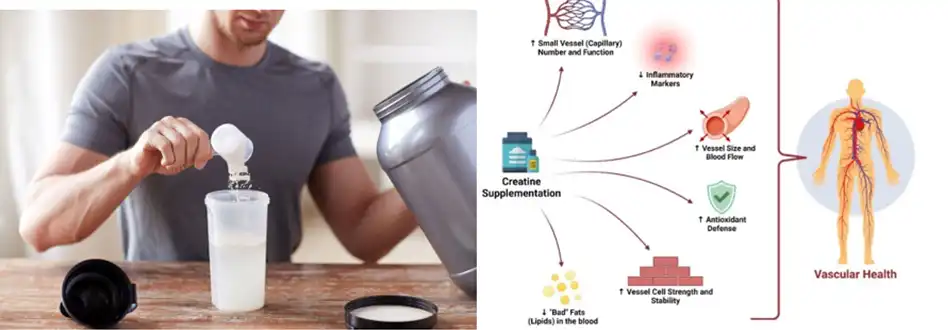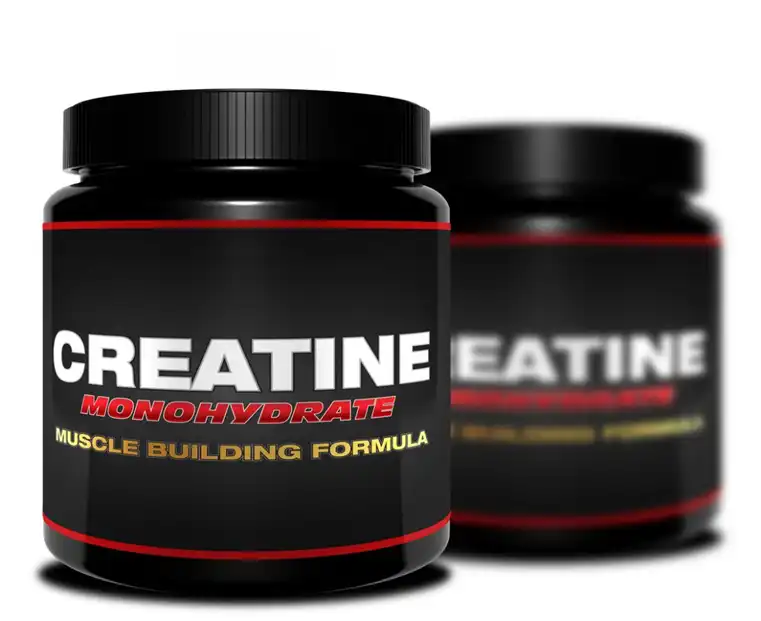What Does Creatine Do and Why You Should Use It for Muscle Growth
Unlock Your Athletic Potential with Creatine: The Ultimate Supplement for Strength and Performance
Are you looking to elevate your fitness game and achieve your athletic goals? If so, creatine might just be the missing piece of your supplement stack. Widely regarded as one of the most effective and researched sports supplements available, creatine has garnered attention from athletes, bodybuilders, and fitness enthusiasts alike. But what exactly is creatine, and how can it benefit you? Let’s dive in!
What is Creatine?
Creatine is a naturally occurring compound found in small amounts in certain foods (like red meat and fish) and synthesized in the body from amino acids. It plays a crucial role in the production of adenosine triphosphate (ATP), the primary energy carrier in cells. This means creatine is vital for short bursts of intense physical activity, such as sprinting, weightlifting, or high-intensity interval training (HIIT).
When you supplement with creatine, you increase your muscles' phosphocreatine stores, allowing for more ATP production during intense exercise. This leads to improved performance, increased strength, and enhanced muscle recovery.

Why Should You Consider Creatine?
Enhanced Strength and Power: One of the most significant benefits of creatine supplementation is its ability to increase strength and power output. By increasing your muscle's phosphocreatine stores, creatine allows for faster regeneration of ATP, enabling you to push harder during workouts, lift heavier weights, and maximize your performance in the gym.
Accelerated Muscle Growth: Creatine doesn't just help you lift more; it also contributes to muscle hypertrophy. Studies have shown that creatine can stimulate muscle protein synthesis and promote water retention in muscle cells, giving you a fuller, more muscular appearance. This is a game-changer for anyone looking to build lean muscle mass.
Improved Endurance and Performance: While creatine is best known for its benefits in strength training, it can also enhance your performance in endurance activities. By allowing you to maintain higher intensities for longer periods, creatine can improve your overall stamina and endurance, whether you're running, cycling, or participating in team sports.
Faster Recovery: Nobody likes the feeling of muscle soreness after a tough workout. Creatine has been shown to reduce muscle cell damage and inflammation, leading to quicker recovery times. This means you can get back to training sooner and more effectively, helping you stay consistent and reach your goals faster.
Brain Health Benefits: Recent research suggests that creatine may also support cognitive function. By supplying energy to the brain, creatine could enhance memory and mental clarity, making it beneficial not just for athletes but for anyone looking to boost their cognitive performance.

How Creatine Works: Unlocking Your Athletic Potential
Creatine is more than just a supplement; it’s a powerful ally for anyone looking to enhance their athletic performance and achieve their fitness goals. Understanding how creatine works can help you appreciate its benefits and effectiveness. Here’s a closer look at the mechanisms behind this remarkable compound:
1. Powering Your Energy Systems
At the core of creatine’s effectiveness is its ability to boost the body’s energy production during high-intensity exercise. Our muscles rely on ATP (adenosine triphosphate) for immediate energy. However, ATP stores are limited and deplete quickly during intense workouts. This is where creatine comes in.
Stored as phosphocreatine (PCr) in your muscles, creatine donates a phosphate group to ADP (adenosine diphosphate), quickly regenerating ATP. This rapid resynthesis of ATP allows you to sustain energy output, enabling you to push harder and longer during workouts. Whether you’re sprinting, lifting weights, or engaging in explosive sports, creatine helps you tap into your full potential.
2. Amplifying Strength and Power
With increased ATP availability, you can significantly enhance your strength and power. Creatine supplementation has been shown to improve performance in short-duration, high-intensity activities, leading to greater gains in strength. Imagine being able to lift heavier weights, complete more repetitions, and perform explosive movements with ease. Creatine empowers you to break through plateaus and achieve new personal bests.
3. Promoting Muscle Growth
Creatine doesn’t just help you perform better; it also plays a vital role in muscle growth. By increasing water retention within muscle cells, creatine creates a fuller, more muscular appearance. This "cell volumization" effect not only looks impressive but also triggers anabolic pathways that promote muscle protein synthesis. Over time, this can lead to significant increases in muscle mass and definition.
4. Accelerating Recovery
After an intense workout, your muscles need time to recover. Creatine has been shown to reduce muscle cell damage and inflammation, leading to faster recovery times. This means less soreness and a quicker return to your training routine. By minimizing downtime, creatine allows you to train more frequently and with greater intensity, ultimately helping you reach your goals faster.
5. Supporting Brain Health
Beyond physical performance, creatine offers potential cognitive benefits. Research suggests that creatine may enhance brain energy metabolism, supporting cognitive function and providing neuroprotective effects. Whether you’re studying, working, or engaging in sports that require mental focus, creatine can help keep your mind sharp and alert.
Conclusion
Incorporating creatine into your supplement regimen can be a game-changer for your athletic performance. By boosting ATP production, increasing strength and power, promoting muscle growth, accelerating recovery, and supporting brain health, creatine empowers you to maximize your workouts and achieve your fitness aspirations.
Don't settle for mediocrity—harness the power of creatine and unlock your true potential today! Embrace this scientifically-backed supplement and take the first step toward transforming your fitness journey.

The Health Benefits of Creatine: More Than Just Muscle
Creatine is often celebrated for its ability to enhance athletic performance, but its health benefits extend far beyond the gym. This powerful supplement has been extensively studied, revealing a range of advantages that can positively impact your overall health and well-being. Here’s why incorporating creatine into your routine could be one of the best decisions for both your fitness and your health.
1. Enhanced Athletic Performance
At the forefront of creatine's benefits is its ability to improve physical performance. By increasing the availability of ATP (adenosine triphosphate), creatine fuels high-intensity exercise, allowing you to push harder, lift heavier, and perform better. Whether you’re an athlete, a weekend warrior, or someone just starting their fitness journey, creatine can help you reach new heights in your physical capabilities.
2. Increased Muscle Mass
Creatine is a powerful ally for muscle growth. Supplementing with creatine leads to an increase in water retention within muscle cells, giving them a fuller appearance. This volumization effect signals your body to initiate anabolic processes, promoting muscle protein synthesis. Over time, this can result in significant muscle gains, improved body composition, and enhanced physical aesthetics.
3. Faster Recovery Times
Intense workouts can take a toll on your muscles, leading to soreness and fatigue. Creatine has been shown to reduce muscle cell damage and inflammation, helping you recover more quickly between sessions. By minimizing downtime and discomfort, creatine allows you to train more consistently, which is crucial for long-term progress.
4. Support for Brain Health
Recent studies suggest that creatine may have neuroprotective properties, supporting brain health and cognitive function. By enhancing energy metabolism in the brain, creatine could improve memory, focus, and overall mental clarity. This makes it a valuable supplement not just for athletes but for anyone looking to boost their cognitive performance in daily life.
5. Potential Benefits for Aging and Chronic Conditions
Emerging research indicates that creatine may help improve muscle mass and strength in older adults, combating age-related muscle loss (sarcopenia). Additionally, creatine has shown promise in managing various neurological conditions, including Parkinson's disease and amyotrophic lateral sclerosis (ALS), by supporting cellular energy metabolism. These benefits highlight creatine’s potential as a valuable supplement for aging populations and those facing chronic health challenges.
6. Improved Metabolic Health
Creatine supplementation may also contribute to better metabolic health by enhancing insulin sensitivity and glucose metabolism. This can be particularly beneficial for individuals looking to manage their weight or improve their overall metabolic profile. By supporting efficient energy use, creatine can help you maintain a healthy weight and prevent metabolic disorders.

Is Creatine Safe to Take?
Creatine is one of the most researched sports supplements, and numerous studies confirm its safety and effectiveness for healthy individuals. Regulatory bodies like the International Society of Sports Nutrition endorse its use, emphasizing that when taken as directed, creatine poses minimal risk.
While some may experience mild side effects, such as gastrointestinal discomfort or bloating, these can typically be managed by adhering to recommended doses (3-5 grams per day) and staying hydrated.
Concerns about kidney health are largely unfounded, as research indicates that creatine does not cause kidney damage in individuals with normal kidney function. Even for young athletes, creatine can be safe when used responsibly and under professional guidance.
In summary, creatine is a safe and effective supplement that can help enhance athletic performance, support muscle growth, and improve recovery. Embrace the benefits of creatine and elevate your fitness journey with confidence!

Where to Buy Creatine?
You can buy Creatine at YANGGEBIOTECH Company is an industry-leading manufacturer and distributor for pure dietary supplements. yanggebiotech.com is not just a consumer brand. It also supplies pure ingredients to other brands that distribute food and other supplement products. Contact yanggebiotech.com to place an order today.
Why YANGGEBIOTECH is the Best Company to Buy Creatine
1. Exceptional Product Quality: Yangge Biotech prioritizes quality, sourcing creatine from reputable suppliers and conducting rigorous testing to ensure purity and potency.
2. Transparency and Trust: They provide clear information about their manufacturing processes and third-party lab results, giving customers confidence in their products.
3. Diverse Product Offerings: Yangge Biotech offers a wide range of creatine options, including various forms like creatine monohydrate and ethyl ester, catering to different preferences and goals.
4. Expert Guidance: Their knowledgeable team is readily available to assist customers with product selection and usage advice, ensuring informed decisions.
5. Competitive Pricing: Yangge Biotech delivers high-quality creatine at affordable prices, making it accessible for fitness enthusiasts of all budgets.
6. Reliable Shipping: Customers can count on fast and efficient shipping, ensuring timely delivery of their orders.
7. Positive Reputation: With numerous positive reviews from satisfied customers, Yangge Biotech has established a strong reputation for quality and customer service.
In summary, YANGGEBIOTECH stands out as the best company to buy creatine, combining quality, transparency, variety, expert support, affordability, reliability, and a positive customer reputation.
References
Hickner R, Dyck D, Sklar J, Hatley H, Byrd P. Effect of 28 days of creatine ingestion on muscle metabolism and performance of a simulated cycling road race. J Int Soc Sports Nutr. 2010;7:26. doi: 10.1186/1550-2783-7-26
Safdar A, Yardley N, Snow R, Melov S, Tarnopolsky M. Global and targeted gene expression and protein content in skeletal muscle of young men following short-term creatine monohydrate supplementation. Physiol Genomics. 2008;32:219–228
Tyka AK, Chwastowski M, Cison T, Palka T, Tyka A, Szygula Z, Pilch W, Strzala M, Cepero M. Effect of creatine malate supplementation on physical performance, body composition and selected hormone levels in sprinters and long-distance runners. Acta Physiol Hung. 2015 Mar;102(1):114-22. doi: 10.1556/APhysiol.102.2015.1.12.
Deldicque L, Atherton P, Patel R, Theisen D, Nielens H, Rennie M, Francaux M. Effects of resistance exercise with and without creatine supplementation on gene expression and cell signaling in human skeletal muscle. J Appl Physiol. 2008;104:371–378
Hespel P, Derave W. Ergogenic effects of creatine in sports and rehabilitation. Subcell Biochem. 2007;46:245–259. doi:10.1021/bi061646s
Saremi A, Gharakhanloo R, Sharghi S, Gharaati M, Larijani B, Omidfar K. Effects of oral creatine and resistance training on serum myostatin and GASP-1. Mol Cell Endocrinol. 2010;317:25–30. doi: 10.1016/j.mce.2009.12.019
Bazzucchi I, Felici F, Sacchetti M. Effect of short-term creatine supplementation on neuromuscular function. Med Sci Sports Exerc. 2009;41:1934–41. doi: 10.1249/MSS.0b013e3181a2c05c
Dabidi Roshan V , Babaei H, Hosseinzadeh M, Arendt-Nielsen. The effect of creatine supplementation on muscle fatigue and physiological indices following intermittent swimming bouts. J Sports Med Phys Fitness. 2013 Jun;53(3):232-9
Northeast B, Clifford T. The Effect of Creatine Supplementation on Markers of Exercise-Induced Muscle Damage: A Systematic Review and Meta-Analysis of Human Intervention Trials. Int J Sport Nutr Exerc Metab. 2021 Feb 24;31(3):276-291. doi: 10.1123/ijsnem.2020-0282. PMID: 33631721.
Jooyoung Kim, Joohyung Lee, Seungho Kim, Daeyoung Yoon, Jieun Kim, Dong Jun Sung. Role of creatine supplementation in exercise-induced muscle damage: A mini review. Journal of Exercise Rehabilitation 2015;11(5):244-250
Antonio J, Candow DG, Forbes SC, Gualano B, Jagim AR, Kreider RB, Rawson ES, Smith-Ryan AE, VanDusseldorp TA, Willoughby DS, Ziegenfuss TN. Common questions and misconceptions about creatine supplementation: what does the scientific evidence really show? J Int Soc Sports Nutr. 2021 Feb 8;18(1):13. doi: 10.1186/s12970-021-00412-w. PMID: 33557850; PMCID: PMC7871530.
Cribb PJ, Williams AD, Hayes A. A creatine-protein-carbohydrate supplement enhances responses to resistance training. Med Sci Sports Exerc. 2007;39:1960–1968. doi: 10.1249/mss.0b013e31814fb52a
Branch JD. Effects of creatine supplementation on body composition and performance: a meta análisis. Int J Sports Nutr Exerc Metabol. 2003;13:I198-122
Jones AM, Carter H, Pringle JS, Campbell IT (2002) Effect of creatine supplementation on oxygen uptake kinetics during submaximal cycle exercise. J Appl Physiol 92:2571–2577
Binzoni T, Ferretti G, Schenker K, Cerretelli P (1992) Phosphocreatine hydrolysis by 31P-NMR at the onset of constant-load. exercise in humans. J Appl Physiol 73:1644–1649
Lopez RM, Casa DJ, McDermott BP, Ganio MS, Armstrong LE, Marish CM (2009) Does creatine supplementation hinder exercise heat tolerance or hydration status? A systematic review. J Athl Train 44:215–2
R. Twycross‑Lewis, L. P. Kilduff, G. Wang, Y. P. Pitsiladis. The effects of creatine supplementation on thermoregulation and physical (cognitive) performance: a review and future prospects. Amino Acids DOI 10.1007/s00726-016-2237-9
Kerksick CM, Wilborn CD, Roberts MD, Smith-Ryan A, Kleiner SM, Jager R, Collins R, Cooke M, Davis JN, Galvan E, Greenwood M, Lowery LM, Wildman R, Antonio J, Kreider RB. ISSN exercise & sports nutrition review update: research & recommendations. J. Int. Soc. Sports Nutr. 2018;15:38–y.
Kreider RB, Jung YP. Creatine supplementation in exercise, sport, and medicine. J Exerc Nutr Biochem. 2011;15(2):53–69. 7. Hultman E, et al. Muscle creatine loading in men. J Appl Physiol (1985). 1996;81(1):232–7.
Buford T, Kreider R, Stout J, Greenwood M, Campbell B, Spano M, Ziegenfuss T, Lopez H, Landis J, Antonio J. International Society of Sports Nutrition position stand: creatine supplementation and exercise. J Int Soc Sports Nutr. 2007;4:6. doi: 10.1186/1550-2783-4-6
Ralf Jäger, Martin Purpura, Andrew Shao, Toshitada Inoue, Richard B, Kreider. Analysis of the efficacy, safety, and regulatory status of novel forms of creatine. Amino Acids (2011) 40:1369–1383 DOI 10.1007/s00726-011-0874-6
Kreider RB, et al. Long-term creatine supplementation does not significantly affect clinical markers of health in athletes. Mol Cell Biochem. 2003;244(1–2):95–104.
Send Inquiry
Related Industry Knowledge
- how to use blue spirulina powder?
- Why Pea Protein Peptide is the Ideal Choice for Your Health and Fitness Goals
- Yeast Beta-Glucan: What is it & How is it Beneficial?
- Quercetin vs Astaxanthin
- Are evening primrose oil and borage the same?
- Mind and Body Benefits of Lions Mane Powder
- Mental and Health Benefits of Mushroom Supplements
- what is Beta carotene good for?
- 2024 Global Food Color Market Report- Trends, Forecast, And Competitive Analysis - YANGGEBIOTECH
- Premium Hydrolyzed Keratin: Optimal Hair & Skin


